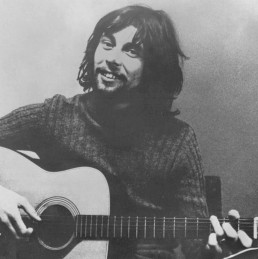 Singer/songwriter Rab Noakes was born in Fife, Scotland in
1947. Having short lived Civil Service careers in Glasgow and London - and as a
paper mill guillotine operator’s assistant with the grand title of “Flying
Carpet Servicer” (honest!), he became well known early on in the folk music
scene. He played as a solo artist on albums for Archie Fisher, Barbara Dickson,
and was a band member of both the Wayfarers and The Great Fife Road Show.
Singer/songwriter Rab Noakes was born in Fife, Scotland in
1947. Having short lived Civil Service careers in Glasgow and London - and as a
paper mill guillotine operator’s assistant with the grand title of “Flying
Carpet Servicer” (honest!), he became well known early on in the folk music
scene. He played as a solo artist on albums for Archie Fisher, Barbara Dickson,
and was a band member of both the Wayfarers and The Great Fife Road Show.
He formed a special relationship with Lindisfarne - from the birth of the band,
through shared tours and musical collaborations including his appearance on the
“Another Fine Mess” video. Various band members have appeared on Rab's albums as
session musicians. Ray Jackson being one, whilst Rod Clements was a part time
member of Rab's backing band, The Varaflames. Billy Mitchell included a version
of Rab's "Somebody Counts On Me" on his 1993 Almost Grown album.
After working for some years as head of the entertainment department at BBC
Radio Scotland, he left to form his own media company with wife Stephanie
Pordage - but he still tours regularly, solo or as a duo with Fraser Speirs.
For more information on Rab, his website site is at
www.rabnoakes.com
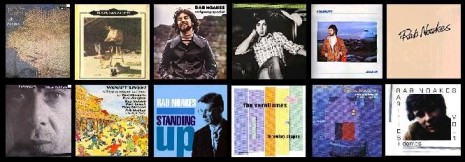
What first got you interested in music, i.e. were your
parents’ musical, or was there a local music scene in Fife?
My interest started very young. My mum sang a bit with the big bands during the
war, but it was mainly by listening to the radio in the 50’s, pre rock & roll
really – Guy Mitchell and The Weavers were early memories. I could always carry
a tune, and got a reputation at an early age as “Bobby Noakes” the lad who would
always be ready to ‘give a song’. My dad was with the Post Office and I would
sometimes do Scottish songs at their Christmas party. As I got interested in pop
music, I would do some Cliff Richard songs and the like; a favourite was “Mary’s
Boy Child” – a big hit at the time for Harry Belafonte, which also became a hit
with me at these parties! My parents sent me for violin lessons which I probably
shouldn’t have given up. However my main interested has been in singing songs
rather than in music, that has been the consistent factor in my life.
Having moved to London and a brief stint with Gerry Rafferty and Joe Egan as
a founding member of Stealers Wheel, you decided the rock scene wasn't for you,
and not long after you returned home they had a smash hit single. Any regrets?
It wasn’t that the rock scene wasn’t for me – in fact I stayed working with some
of those people. I first met Gerry Rafferty with Tam Harvey and Billy Connolly
as the Humblebums in February 1969 – I was invited to sing with them at a
concert at Glasgow City Hall. We met up on a Sunday afternoon at Billy
Connolly’s father’s house to rehearse for the gig. By the end of the evening
Gerry and I felt we had a kindred spirit, we bumped into each other on
subsequent occasions before we decided to work together.
Ray Jackson's solo LP ‘In the Night’ included a cover of the Stealers Wheel
song "Everything Will Turn Out Fine". You have played on a recent Gerry Rafferty
album; do you have any further projects planned?
We keep in touch - the album you refer to is about ten years old now. Nothing
specifically planned, but it is very possible we’ll do something again.
Did you first meet Alan Hull at the Rex Hotel in Tynemouth? How come you
started gigging there, and did you go down there regularly? Any interesting
recollections of that time?
I first met Alan at the Duke Of York in Wallsend - a folk club run by “Ma”
Fisher, mother of Archie Fisher. Archie had taken me down to gig there. I
remember Alan there in his navy blue greatcoat. I met the Brethren boys at “Ma”
Fisher’s house around that time. Alan Hull and Brethren were just joining
forces. The Rex Folk Club followed from that.
Lindisfarne recorded three of your songs - "Turn A Deaf Ear”,"Together
Forever", and "On My Own I Built A Bridge" (which turned up many years later on
‘BT2’). How did that come about? On "Deaf Ear" the lyrics they replaced one of
your verses with their own. Was this a surprise to you? How did Lindisfarne pick
up on "Turn A Deaf Ear" in 1970 when it wasn't commercially available until
1975?
I wasn’t asked, yet I wasn’t surprised considering the mischievous wit of
Lindisfarne, but that was fine by me! I guess they must have just picked it up
the song when listening to my performance. It was fortunate for me
publicity-wise. I was intrigued to hear about “Bridge” included on that CD,
because at that time there was quite a lot of changing of information between
us. I was quite pleased to introduce them to the trick of tuning the E string to
D which is what happened with that song. Alan told me some time later that had a
direct effect on the final arrangement of “Clear White Light”.
Do you have a favourite Alan Hull or Lindisfarne song or album?
A number of songs from various places: “Clear White Light”, Winter Song” – I
like the Transatlantic recording of Alan’s “We Can Swing Together”. Songs Like
“Malvinas Melody” and “Poor Old Ireland” which were almost quite daring at the
time for their political stance, and stated their case full on.
Both your second (self titled) album and Lindisfarne's second album were both
produced by Bob Johnston - what was he like to work with?
He was quite interesting to work with; we just kind of got on with it. The
recordings were done pretty much “on the floor”. That was the way we used to
make records – almost live, that’s what ended up on the record!
Back in 1974, "Branch" was very nearly a hit single – it received a lot of
airplay. Do you ever feel cheated that you never got the national fame that you
richly deserved? There is a BBC transcription disc kicking around of you and
Lindisfarne appearing together around this period on John Peel's "In Concert".
The asking price can be up to £100 - food for thought?
You bet! I’ve never come across that disc! Yes, both “Clear Day” and “Branch”
were turntable hits. I don’t feel cheated, but it’s all water under the bridge
now.
How did you get involved with Ringo Starr's short-lived "Ring O’ Records"
label for your 1978 album ‘Restless’? Did you ever meet him?
I had made a demo tape over at Gerry Rafferty’s house in Kilmacolm over five
days in 1976. The tape did the rounds and ended up with Polydor. It was picked
up by a Gerry Condon who said he wanted to take it to his next job. This turned
out to be a new label created by Ringo under the Polydor umbrella. The recording
was done at Tittenhurst Park which Ringo had access to and where John Lennon
recorded “Imagine”, in that big front room. I only met Ringo once, but he did
send me a thank you telegram, which I’ve kept. It was an interesting experience.
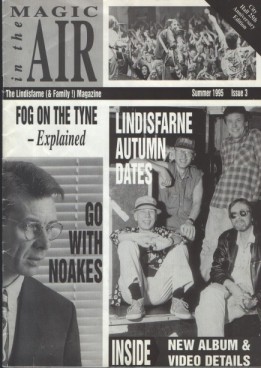 AKA Robert Noakes, successful BBC producer, you made the excellent Radio 2
"Meet Me On The Corner - The Story Of Lindisfarne" broadcast in 1995. You
interviewed a lot of people – can you tell us a little about that?
AKA Robert Noakes, successful BBC producer, you made the excellent Radio 2
"Meet Me On The Corner - The Story Of Lindisfarne" broadcast in 1995. You
interviewed a lot of people – can you tell us a little about that?
At the time I was just leaving BBC Radio Scotland as head of musical
entertainment. We did the job on behalf of Radio 2, but Radio Scotland recut it
and put it out after Alan’s death, which included an extra interview with Rod.
The method if you have time is to get each band member to tell the whole story,
then you can pick and choose which bits to use. Ray Laidlaw, Rod and Alan gave
extensive interviews. I wrote and produced it, and I felt it would be good for
Tim Healey to present it. The recording itself happened to be of historical
interest as it was the first recording on a new hard disc editing system, which
we now use all the time.
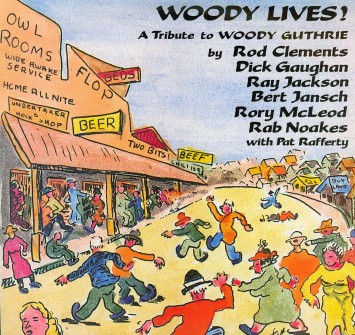 You
played on the Woody Guthrie tribute album ‘Woody Lives’, which also included
contributions from Ray Jackson & Rod Clements. Is there a story of how this
album came to be?
You
played on the Woody Guthrie tribute album ‘Woody Lives’, which also included
contributions from Ray Jackson & Rod Clements. Is there a story of how this
album came to be?
It was Geoff Heslop’s idea. He had the studio over five days on a “turn up when
you can” basis – whoever was there would record, which lead to a sort of musical
chairs with the combinations of the artists.
Varaflames personnel line up seems fairly loose; can we expect more from
them? Any possibility of more collaborations with part-time Varaflame Rod
Clements?
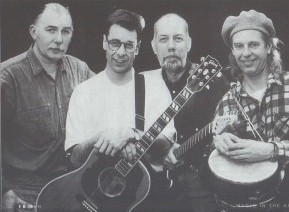 Yes you can, there is a new Varaflames album on hard drive as we speak, it just
needs finishing but there is no great hurry, we’ll maybe try to get it out by
the end of this year. Last summer we had unscheduled free studio time, and we
managed to lay five tracks down in one day, which I like for that spontaneous
live feeI.
Yes you can, there is a new Varaflames album on hard drive as we speak, it just
needs finishing but there is no great hurry, we’ll maybe try to get it out by
the end of this year. Last summer we had unscheduled free studio time, and we
managed to lay five tracks down in one day, which I like for that spontaneous
live feeI.
I do love to work with Rod, and hopefully we will do something again. I think we
have a complimentary view on things, which comes in when we work together. He
was a great bass player, but I would prefer him playing guitar. In recent years
he has developed a unique approach to the way he plays it. I know he and Fraser
have done a couple of things together.
Performing as a duo with harmonica wizard Fraser Speirs works extremely well
- how did the two of you begin working together?
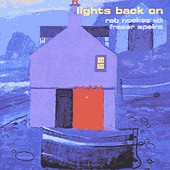 I’ve known Fraser for years. I had seen him working before, and when I did the
soundtrack for a TV series called “Your Cheating Heart” we needed someone in to
play the harmonica. Although we had done a few small things (we had done a Jazz
night at the a Glasgow Music Festival), that brought us together with a
different kind of communication, and things followed on from there. He has a
real feel for a song, and gets into the shape of it rather than just sucking and
blowing! The first major project we did was with the Varaflames in 1995, the
idea being to put a band out on the road and do some shows.
I’ve known Fraser for years. I had seen him working before, and when I did the
soundtrack for a TV series called “Your Cheating Heart” we needed someone in to
play the harmonica. Although we had done a few small things (we had done a Jazz
night at the a Glasgow Music Festival), that brought us together with a
different kind of communication, and things followed on from there. He has a
real feel for a song, and gets into the shape of it rather than just sucking and
blowing! The first major project we did was with the Varaflames in 1995, the
idea being to put a band out on the road and do some shows.
How did you team up with ex Dire Straits drummer Pick Withers?
Pick and Rod and I had worked together back in 1975. That was kind of the route,
which led him to working with Dire Straits. I was doing at a gig near Heathrow
Airport, and the drummer in the support band was Pick. I was looking for a
drummer to support the “Never Too Late” tour and identified Pick as the guy for
the job. I liked his style.
The creation of your own ‘Neon Productions’ company in 1995, must give you
the satisfaction of being able to do what you want to do (obviously within the
commercial restraints!). What kind of area is it involved in? Are you pleased at
the way things are developing?
As a media production company, we started by working on commissions for radio
programmes which we still do, and we moved also into TV work. With the creation
of the Varaflames tapes in 1995, we thought the best way to put them out would
be by starting our own “Neon” record label. This year we had a great leap
forward in putting out the Karine Polwart album, which is the first with another
artist, and there will be others to come. It is an area we wish to develop,
using both my managing and record producing skills. I never want to stop my own
singing, so it also gives me a platform to continue doing that.
Your innovative website includes details of your back catalogue. The recent
album release
‘Demos & Rarities’ sums up your talent - even the "doodles" (as you call these
early tracks) are of a high musical quality. The docu-video included on the CD
is a great idea, but what about the possibility of seeing more of your albums on
CD - any progress on the plan to re-release ‘Red Pump Special’ and ‘Never Too
Late’?
The re-releases are still alive as a project, but there are big changes within
the big record companies, and it has taken a bit longer than we had hoped, but
we still expect those two to happen, and hopefully some of the earlier stuff as
well. Tracking the ownership and the legalities with some of the other
recordings can get a bit daunting! There is a new release (March 22nd.) on River
Records called ‘The River Sessions’ – some back catalogue content that was from
the early 80’s, which includes broadcast work of sessions and concerts.
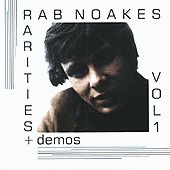 As regards ‘Demos & Rarities’, my wife Stephanie Pordage doesn’t play or sing,
but comes up with some pretty good ideas. As well of helping to write a couple
of songs on the “Lights Back On” album, She bravely went through a big box full
of my early songs, recorded on quarter track, dating back to about 1969. Her
selections became the “Demos & Rarities” album. I really had little to do with
the project!
As regards ‘Demos & Rarities’, my wife Stephanie Pordage doesn’t play or sing,
but comes up with some pretty good ideas. As well of helping to write a couple
of songs on the “Lights Back On” album, She bravely went through a big box full
of my early songs, recorded on quarter track, dating back to about 1969. Her
selections became the “Demos & Rarities” album. I really had little to do with
the project!
Any tours imminent?
Things have been very busy with the company recently, which is why things were
pretty quiet as regarding tours in 2003. I would like to get out at the latter
part of this year but hopefully more so in 2005 which should coincide with the
new Varaflames album. Touring is the last thing I would give up – singing really
underpins everything I do, which takes us back to your first question!
Rab Noakes, we look forward to future projects. Thanks very much.